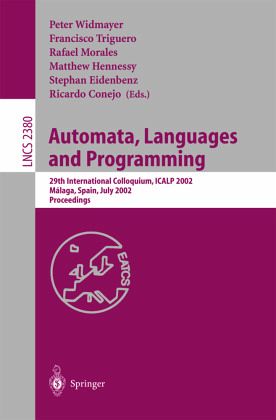Nicht lieferbar

Automata, Languages and Programming
29th International Colloquium, ICALP 2002, Malaga, Spain, July 8-13, 2002. Proceedings
Herausgegeben: Widmayer, Peter; Triguero, Francisco; Morales, Rafael; Hennessy, Matthew; Eidenbenz, Stephan; Conejo, Ricardo
Versandkostenfrei!
Nicht lieferbar
This volume contains the contributions of the 29th International Colloquium on Automata, Languages, and Programming (ICALP) held July8 13, 2002 in M alaga, Spain. The diversityand the qualityof the scienti?c program of ICALP 2002 serve as evidence that theoretical computer science with all its aspects continues to be a vibrant ?eld and is increasinglyturning into a valuable and abundant source of ideas and concepts for other research disciplines and app- cations. ICALP has been the main annual scienti?c event of the European Assoc- tion for Theoretical Computer Science (EATCS) for almost thirt...
This volume contains the contributions of the 29th International Colloquium on Automata, Languages, and Programming (ICALP) held July8 13, 2002 in M alaga, Spain. The diversityand the qualityof the scienti?c program of ICALP 2002 serve as evidence that theoretical computer science with all its aspects continues to be a vibrant ?eld and is increasinglyturning into a valuable and abundant source of ideas and concepts for other research disciplines and app- cations. ICALP has been the main annual scienti?c event of the European Assoc- tion for Theoretical Computer Science (EATCS) for almost thirtyyears, making ICALP one of the best-established conferences in theoretical computer science and EATCS one of the world s largest and oldest theoretical computer science organizations. To re?ect the two parts of the EATCS journal Theoretical Computer Science (TCS), ICALP s technical program is split into two parts: while track A is - voted to algorithms, automata, complexity, and games, track B focuses on logic, semantics, and theoryof programming.




